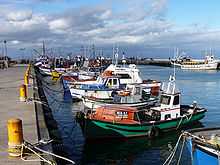Kalk Bay
| Kalk Bay Kalkbaai | |
|---|---|
 | |
 Kalk Bay | |
|
Location within Cape Town  Kalk Bay | |
| Coordinates: 34°07′40″S 18°26′54″E / 34.12778°S 18.44833°ECoordinates: 34°07′40″S 18°26′54″E / 34.12778°S 18.44833°E | |
| Country | South Africa |
| Province | Western Cape |
| Municipality | City of Cape Town |
| Main Place | Cape Town |
| Government | |
| • Councillor | David Dalton |
| Area[1] | |
| • Total | 0.32 km2 (0.12 sq mi) |
| Population (2011)[1] | |
| • Total | 700 |
| • Density | 2,200/km2 (5,700/sq mi) |
| Racial makeup (2011)[1] | |
| • Black African | 8.1% |
| • Coloured | 32.3% |
| • Indian/Asian | 0.1% |
| • White | 54.6% |
| • Other | 4.9% |
| First languages (2011)[1] | |
| • English | 86.2% |
| • Afrikaans | 10.3% |
| • Other | 3.5% |
| Postal code (street) | 7975 |
| PO box | 7990 |

Kalk Bay (Afrikaans: Kalkbaai) is a fishing village on the coast of False Bay, South Africa and is now a suburb of greater Cape Town. It lies between the ocean and sharply rising mountainous heights that are buttressed by crags of grey sandstone. A literal translation from the Dutch/Afrikaans name "Kalkbaai" is "Lime Bay". This derives from the vast deposits of mussel shells found there, which early settlers burned to make lime for construction. Lime kilns to roast mussel shells are still found along the west coast. The railway from the central business district of Cape Town to Simon's Town passes through Kalk Bay and in some places the line is only metres from the water's edge.
Many famous caves (with names such as 'Ronan's Well', after the Walter Scott novel St. Ronan's Well, and 'Free Drinks Saloon') are located in the mountains above the village.[2] They are of importance to spaeleologists because they have formed in sandstone. Large cave systems are not often found in this type of chemically unreactive rock.[3]
Kalk Bay is also home to the famous surf spot named "Kalk Bay Reef". This is renowned for heavy barrels and the associated shallow reef. It is best surfed on a big south-easterly swell or a north west wind. In smaller swells low tide makes for better barrels.
See also
References
External links
| Wikimedia Commons has media related to Kalk Bay. |
.svg.png)